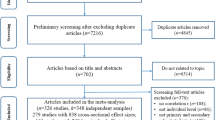Abstract
This article compares the effects of family background and school resources on fourth-grade students’ math achievement, using data from the 2011 Trends in International Mathematics and Science Study (TIMSS). In order to ameliorate potential floor effects, it uses relative risk and population attributable risk to examine the effects of family background and low levels of school resources. Four findings stand out: (1) the percentage of vulnerable students decreases as GDP increases, but this relationship weakens at higher levels of GDP; (2) the relative risk associated with low socioeconomic status is positively related to GDP, but the relative risk associated with low school resources is unrelated to GDP; (3) the population attributable risk associated with some of the family and school risk factors tends to fall with rising GDP, but varies considerably amongst countries; and (4) family background effects are stronger than school resource effects in low- and high-income countries.










Similar content being viewed by others
References
Allen, M. J., & Yen, W. M. (2002). Introduction to measurement theory. Long Grove, IL: Waveland Press.
Baker, D., Goesling, B., & LeTendre, G. (2002). Socioeconomic status, school quality, and national economic development: A cross-national analysis of the “Heyneman-Loxley Effect” on mathematics and science achievement. Comparative Education Review, 46, 291–312.
Bowles, S., & Levin, H. M. (1968). The determinants of scholastic achievement: An appraisal of some recent evidence. The Journal of Human Resources, 2, 3–24.
Chudgar, A., & Luschei, T. F. (2009). National income, income inequality, and the importance of schools: A hierarchical cross-national comparison. American Educational Research Journal, 46(3), 626–658.
Coleman, J., Campbell, E. Q., & Hobson, C. J. (1966). Equality of educational opportunity. Washington, DC: US Government Printing Office.
Gamoran, A., & Long, D. (2007). Equality of educational opportunity: A 40-year retrospective. In R. Teese, S. Lamb, & M. Duru-Bellat (Eds.), International studies in educational inequality, theory and policy (pp. 23–48). Dordrecht: Springer.
Hanushek, E. A., & Luque, J. A. (2003). Efficiency and equity in schools around the world. Economics of Education Review, 22(5), 481–502.
Harris, D. N. (2007). Diminishing marginal returns and the production of education: An international analysis. Education Economics, 15(1), 31–53.
Heyneman, S. P., & Loxley, W. (1983). The effect of primary-school quality on academic achievement across twenty-nine high-and low-income countries. American Journal of Sociology, 88, 1162–1194.
Ilie, S., & Lietz, P. (2010). School quality and student achievement in 21 European countries. In D. Hastedt & M. von Davier (Eds.), Issues and methodologies in large-scale assessments (pp. 57–84). Princeton: IEA-ETS Research Institute.
Kyriakides, L., Campbell, R. J., & Gagatsis, A. (2000). The significance of the classroom effect in primary schools: An application of Creemers’ comprehensive model of educational effectiveness. School Effectiveness and School Improvement, 11(4), 501–529.
Levin, H. H., & Belfield, C. R. (2002). Families as contractual partners in education. UCLA Law Review, 49, 1799–1824.
Martin, M. O., & Mullis, I. V. S. (Eds.) (2012). Methods and procedures in TIMSS and PIRLS 2011. Chestnut Hill, MA: TIMSS & PIRLS International Study Center, Boston College.
Mortimore, P., Sammons, P., Stoll, L., Lewis, D., & Ecob, R. (1988). School matters. Wells, Somerset: Open Books.
Nonoyama-Tarumi, Y., & Willms, J. D. (2010). The relative and absolute risks of disadvantaged family background and low levels of school resources on student literacy. Economics of Education Review, 29(2), 214–224.
Riddell, A. R. (1989a). An alternative approach to the study of school effectiveness in the third world countries. Comparative Education Review, 33(4), 481–497.
Riddell, A. R. (1989b). Response to Heyneman. Comparative Education Review, 33(4), 505–506.
Tramonte, L., & Willms, J. D. (2010). Cultural capital and its effects on education outcomes. Economics of Education Review, 29(2), 200–213.
WHO [World Health Organization] (2011). WHO report on the global tobacco epidemic, 2011: Warning about the dangers of tobacco. Geneva: WHO Press.
Willms, J. D. (2010). School composition and contextual effects on student outcomes. Teachers College Record, 112(4), 1008–1037.
Author information
Authors and Affiliations
Corresponding author
About this article
Cite this article
Nonoyama-Tarumi, Y., Hughes, K. & Willms, J.D. The role of family background and school resources on elementary school students’ mathematics achievement. Prospects 45, 305–324 (2015). https://doi.org/10.1007/s11125-015-9362-1
Published:
Issue Date:
DOI: https://doi.org/10.1007/s11125-015-9362-1




